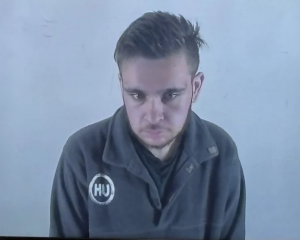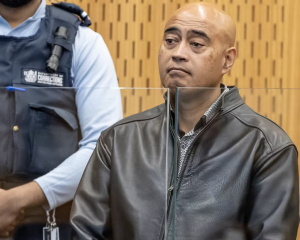
It was the evening of February 27 when former Nelson City mayor Rachel Reese arrived home from a trip to the supermarket.
She parked her car in the driveway outside the house, which is tucked away in a tight cul-de-sac among hillside homes, opened the garage door with the key fob in her hand, and walked inside carrying bags of groceries.
As she approached the interior staircase that led down to the garage she heard running on the wooden stairs.
Reese’s husband was away at the time, and for “one ridiculous second” she thought he had come back early.

The stranger who confronted her, who had got in through a sliding door from an upstairs deck, launched himself at her.
“He shouted, ‘Why are you in my house, this is my house - it’s been decreed this is my house”.
He continued to yell at Reese, getting closer all the time. Afraid he would lash out or grab her, she backed away.
“I was so shocked, he was screaming and ranting at me, and I just thought, ‘I have to protect myself’. I didn’t want to antagonise him - I just wanted to be as invisible as I could be.”
The man then moved to her car parked on the driveway and began rummaging around looking for what Reese said was the remote fob that controlled the garage door. She said he became even angrier when he noticed she had it in her hand, and yelled at her to shut the garage door.
She believed at that point that if she didn’t close the garage door “he would come after me”.
Reese moved quickly outside and closed the garage door but when the stranger realised it was closing, he ran back inside.
Neighbour Warren Borlase heard the yelling and came to help. By this stage the man was on the upstairs deck, looking down at them and yelling “irrational comments” until the police arrived minutes later.
Borlase had initially thought it was a loud domestic dispute somewhere in the street but then ran when he realised it was coming from Reese’s home.
He found her on the phone to the police, having been barely able to dial 111 because she was fumbling so much.
The man continued yelling “insane” comments, Borlase said.
“He was spouting idiotic rubbish on replay; this crazy Magna Carta speak, and something about missing children being in the house, like, ‘this is where all the kids in Nelson are who’ve gone missing - this is where they are’.”
Borlase says he wasn’t afraid for himself, but he was genuinely concerned the man might come downstairs and attack Reese.
“When the dust had settled, I realised how bad it might have been. It’s interesting what these things do to you physically because the next day I felt wrecked.”
Reese says a chilling find after the man had been taken away was a builder’s nail gun on the upstairs deck, lying where he had made himself at home with a coffee.
The police summary of facts confirmed he was carrying a nail gun he had brought with him.
“I felt sick when it was found. What possible reason would someone be carrying around a nail gun?”
It was next to his backpack and other belongings he had brought with him, among which Reese found the spare keys to the house and car that he had gathered.
The police also found a book on political leaders that he had brought with him.
Local Government New Zealand chief executive Susan Freeman-Greene says Reese's story is "horrific" and a worrying sign that the sector might be facing rising levels of intimidation and abuse.
Reese, a former Nelson City Councillor and later a three-term mayor before stepping down in 2022, still works as a consultant in the local government sphere.
“Given the job I did, I was the subject of threats and abuse but coming home was my salvation - it was my haven.
“Having someone who’s been through our home and showered in our bathroom - it is a real invasion.”
She says she “foolishly” stayed at home alone that night.

The shock and fear soon gave way to anger at what happened next.
The first appearance in court
The 41-year-old man was initially charged with unlawfully being in a building and on March 1, he appeared in the Nelson District Court before a community magistrate who convicted and discharged him.
Reese was bewildered - and afraid.
“I found it incomprehensible that he could do what he did and be let go.
“I just went, no, this is not right.”
Neither did she think the man should have been released back into the community.
The next day, in the early hours of March 2, the man allegedly destroyed hundreds of plants at a commercial nursery near Motueka, after entering the property on his motorbike and allegedly destroyed the CCTV camera when he noticed it, the police summary of facts says.
On advice from friends, colleagues and contacts within law enforcement outside the region, Reese went back to the police.
She is grateful to the detective who re-visited the complaint and who checked in on her wellbeing.
The man was arrested again on March 5, after speeding from police on his motorbike when they tried to pull him over. He was charged with having carried out a threatening act towards a house and a person in it; failing to comply with a search, and two charges of intentional damage, linked to the events at Reese’s property.
He was also charged with burglary linked to the incident at the Motueka property.
Police sought an order under Section 38 to have him detained for mental health assessment and treatment.
On March 25 the man appeared before Judge David Ruth and was remanded back into the care of mental health services, then released later as an inpatient from a compulsory treatment order.
He appeared in court again on May 20 when Judge Jo Rielly found him not guilty, on reasons of promoted insanity and remanded to a disposition hearing on Monday.
Judge Rielly said that a psychologist’s opinion was that in the period leading up to, during and after the alleged offending he had been suffering grandiose delusions, elevated mood, lack of sleep and no insight into erratic behaviour.
At the time he presented a risk to himself and others, and due to his manic, psychotic state, he was unable to understand what he was doing.
At the hearing, before Judge Tony Zohrab, the grounds of insanity were made out, the man was released, and a final order was made suppressing his name.
Judge Zohrab said at the core of the man’s illness was his “persecutory and paranoid belief” that other people were out to harm him.
He was satisfied that in the circumstances, based on expert opinion, publication would cause the defendant extreme hardship.
“It would not help his recovery or rehabilitation which is what we want and which is in the public’s best interest,” Judge Zohrab said.
Defence lawyer Mark Dollimore said the man had “excellent family support” and systems were in place to ensure he complied with the compulsory treatment order, including his need for ongoing medication.
Reese told NZME outside court that the end result “did not change the fact that something very wrong happened”.
“If there is one positive out of this, it is the (ongoing) compulsory treatment order. I hope that monitoring occurs, but there has to be a better way to reduce risk to people than the current system.”
The police declined NZME’s request under official information for details about the case that led to the initial charge on February 27, on privacy grounds.
A second request for information about how it was that fresh charges were laid concerning the same incident at Reese’s home, was also declined.

The police told Reese they did not think it was a targeted break-in, but she is not convinced.
‘He appeared to spend ages looking for one house’
The police summary of facts said the man had entered the house via an upstairs sliding door. Reese says it was locked from the inside, but it’s possible the mechanism that she found broken was initially faulty, allowing access from outside.
The summary also said that at some point during his visit, he had gone outside to the glasshouse and smashed two panels then went back into the house, had a shower, charged his vape and made himself a drink.
The second charge of intentional damage was laid after it was found that a nail from the gun had been fired into the tyre of Borlase’s Audi parked out on the road. The mechanic who fixed the tyre gave the nail to Borlase who gave it to the police.
Reese says it’s not unreasonable to think the man was there for a purpose. He was speaking the Sovereign Citizen “agenda”, the language and dialogue used by the league of anti-government activists whose presence swelled during the Covid-19 pandemic and in opposition to Government measures to try and contain it.
“He’d found a politician’s house and whether in the process of doing all that it triggered a psychotic episode, I don’t know but I don’t think he randomly turned up in this street. I just don’t.”
Borlase remains suspicious that it was a targeted break-in. He had seen the same motorbike in the street days before.
Warren Borlase discovered the nail that had caused a flat tyre on his Audi was from a nail gun. Photo / Tracy Neal
“He appeared to spend ages looking for one house,” Borlase said.
The man had also been seen in the neighbourhood that morning and again in the afternoon, riding up and down. He was acting suspiciously enough for another neighbour to note down his licence plate and call Crime Stoppers.
He was then seen on security cameras speeding away but returned when Reese left her house around 4pm for an outing before heading to the supermarket.
The incident has alarmed Local Government New Zealand, which says it’s a worrying sign that the sector might be facing rising levels of intimidation and abuse.
Chief executive Susan Freeman-Green says Reese’s story is “horrific” and that LGNZ was “very aware” of how serious the situation was.
“This is a rising trend that affects everyone elected in our democracy - whether you’re an MP or a local councillor.”
Nelson Mayor Nick Smith, himself no stranger to threats and abuse in his time in central government, says he was shocked that Reese had experienced an “appalling home invasion”.
“Elected representatives have always been subjected to some degree of verbal abuse in public but having an abuser invade your private home takes it to a more dangerous level,” Smith said.
Tasman Mayor Tim King recently spoke to an LGNZ forum about safety concerns for elected members and council staff. He said the rise in behaviour among those known as Sovereign Citizens had gone from being annoying and time-consuming to that which had raised increasing concerns around public safety.
Fighting for justice
Reese says it was a difficult call for her to escalate the matter with the police, knowing how it could be perceived.
“I found it difficult to talk about and thought, ‘far worse happens to people, don’t make a fuss’, but then, what if he had been stalking me and had he been out there watching?”
The experience has reinforced Reese’s concerns about the increased risk to others brave enough to serve their communities.
She says there needs to be a shift in how local elected members are supported by their organisations because they’re very lonely roles.
“My experience is that the health and safety of elected members, and the issues they face has been poorly understood and resourced by councils.
“Legally, there needs to be a discussion around this. There’s work going on at the central government level but it needs to be extended to local government.”
Freeman-Green says Government ministers and MPs had security resources available to them through parliamentary security which included a full security assessment of their homes and funded upgrades to their security systems.
“Mayors and councillors are out and about in their communities all the time. They are often much more visible and accessible than the local MP.
Freeman-Green said LGNZ achieved one small step in improving security when it got home addresses removed from election advertising in 2022.
This year, it has arranged special sessions with local authority personnel, the police and NetSafe in a move to better support them against rising levels of abuse.
Reese is aware of the immense pressure faced by the police, justice and mental health systems.
“I can see the enormous challenge they’re up against. Part of me can see why they perhaps wanted it pushed through the magistrate’s door and closed. I know how stretched they are but we should be able to feel safe in our own homes.”
Budget 2024 provided $651 million extra over four years in critical support for frontline policing, including $226.1m to deliver an extra 500 police officers.
The mental health sector says despite “skyrocketing rates of mental distress across New Zealand” it was disappointed with the $9.7m in this year’s Budget for a national Mental Health and Addiction Community Sector Innovation Fund.
- By Tracy Neal
- Open Justice multimedia journalist, Nelson-Marlborough










